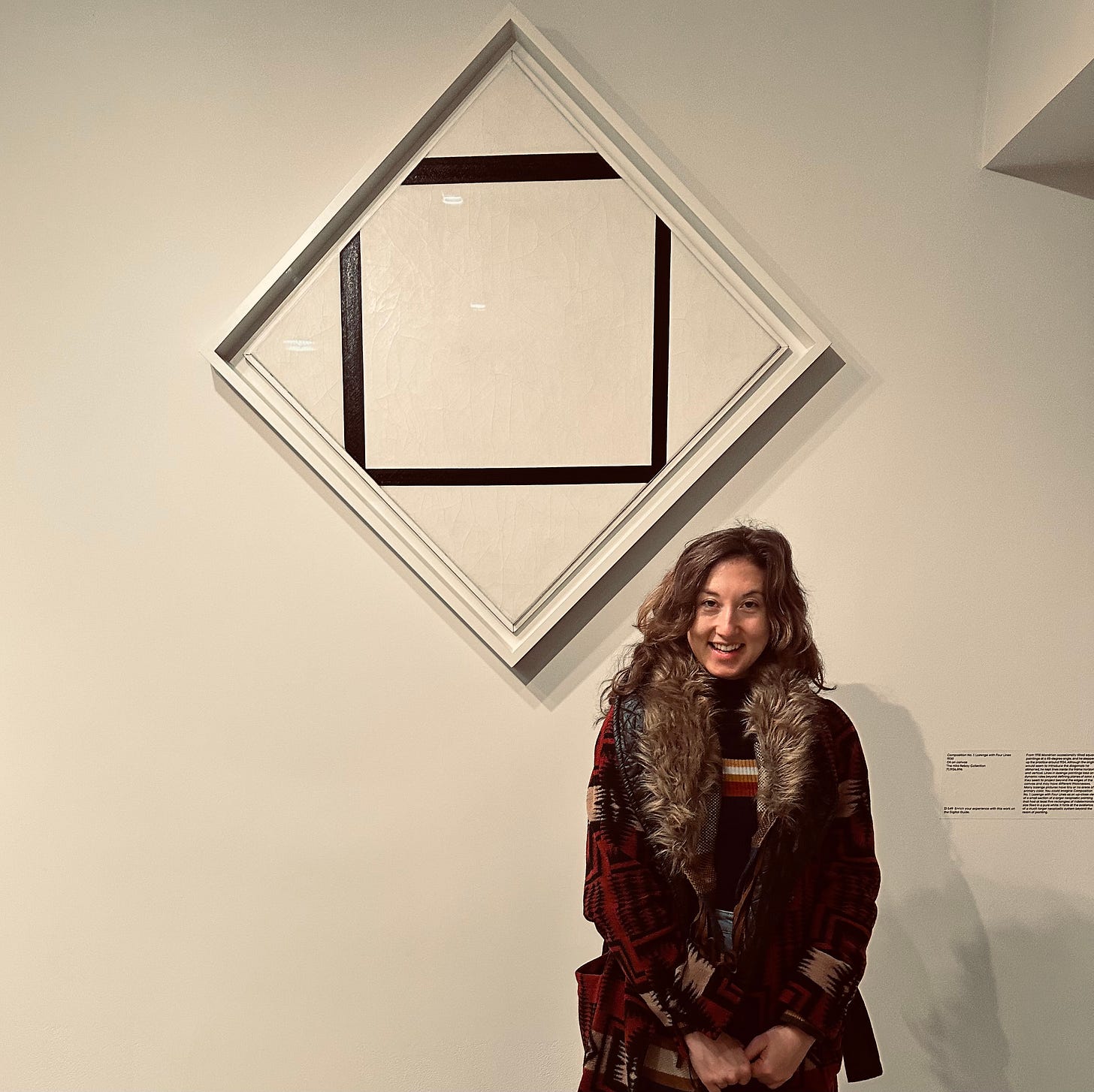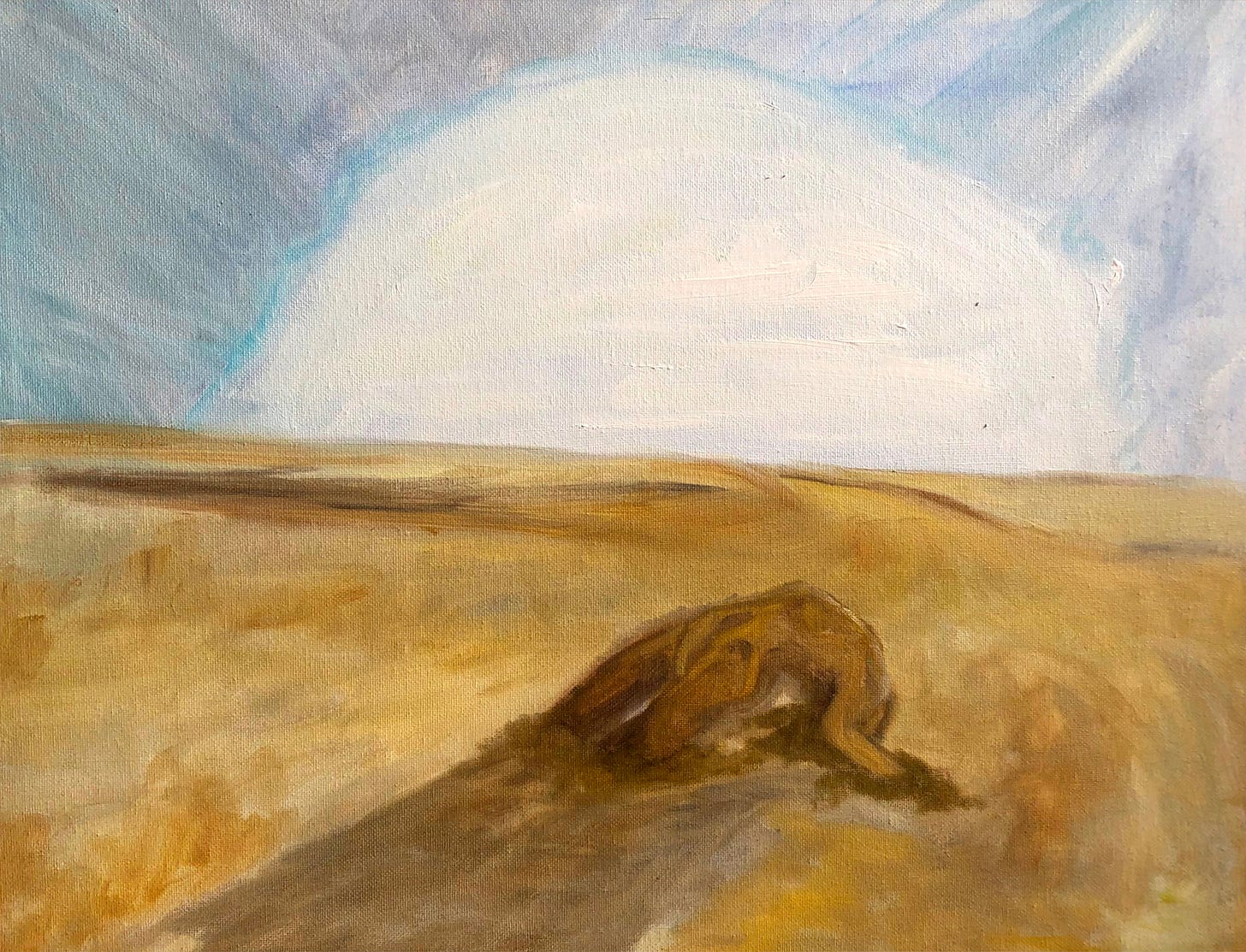The Pinch
The Punch
A few weeks ago I went back to New York for a short stint and finally made it to the Guggenheim, a museum I never managed to visit while I was living there. I’d stopped frequenting art museums around 2015, when I went to grad school and life got busy. But in my first 5 years of city living, they enthralled me. I have fond memories of visiting the Brooklyn Museum during those post-college years of underemployment and wandering, when I was most tortured by both artistic ambition and imposter’s syndrome. I’d go seeking solace and beauty, and would leave feeling awe-inspired, re-legitimized in my own lofty desire to create something beautiful and moving that might stand the test of time.
Anyhoo, it had been some time since I’d been in an art museum, and I guess I kind of expected the Guggenheim adventure to yield a similar experience of inspiration.
Gentle readers, I was surprised to leave the Guggz feeling utterly stale, exhausted… even disgusted! Have I finally become old and jaded, disenchanted by it all? I wondered. Am I over Art?
I’ve had some time to reflect, and I don’t think I’m over Art. I do think I’m over conceptual art1—which there was a lot of at the Guggenheim when I visited—and the endless placards of verbiage that are required to help us understand it. I’m normally not compelled to critique art, because: A. I value art-makers and their efforts; I know it’s easier to tear stuff down than to get in the arena and create, and B. I’m not particularly educated when it comes to visual art and I feel inadequate talking about it. But I strongly believe that "art of the mind rather than the senses” misses something crucial about the function of art, and our wholeness as creatures of body as well as mind.
Let me first admit that I have been intrigued by the very things I’m now criticizing, especially in my 20s. Maybe it was the influence of college, but I had a big appetite for all things highly intellectualized and verbose. I loved stuff that you had to think really hard about. I wanted to know and understand things, to have an explicit grasp of ideas and concepts that I could clearly articulate. So I didn’t shy away from the headiness of conceptual art. It didn’t touch me, but I got some satisfaction from rattling around in my brain and “getting it.”
But college was also when I began to immerse myself in dance training. I spent my 20s forming a deeper awareness of and connection to my body, and gradually began to sense a very different way of knowing and understanding that was not intellectual. In fact, my intellect is faltering as I try to find words for this quieter, more subtle experience of “knowledge.” I was spending more time out of thoughts and in sensations. In movement and body-ness, I was feeling and perceiving something about myself beyond words and ideas. I was getting in closer contact with something that was not cerebral, but still profound. Now after more years and experiences in creative and therapeutic work, I have a slightly better idea of how powerful and immense this dark well of body processes, emotions, and instincts is. I still can’t intellectually grasp it or explain it well, although ironically that’s what I’m trying to do here :)
The talkative, explaining, rationalizing mind tends to be the dominant presence in our awareness. But it is not the end-all be-all of who we are, what we know and understand, and how we experience meaning. I’d venture to say it’s not even as important as it would lead us to believe. There is something in us, about us, beyond words and rational explanations and explicit understanding. Whatever you call it—our unconscious/primal/animal/instinctual/reptilian mind or body—it is deeper and older than the cogitating cortex. It might be ignored, but it won’t be intellectualized away. If it is ignored, it will presence itself in ways we might not rationally understand, in dreams and nightmares, feelings of despair or disconnection, in dysfunctional behavior, maybe even in physical illness.
I think this is where the arts come in, and why they are necessary to our wellbeing and keeping us connected with our totality. They communicate with those dark, silent depths—the part of us that is so big and profound and yet so often goes unknown below the glittering surface of words, reason and explanation. The arts speak directly to it through our senses and emotions, using shape, color, texture, atmosphere, symmetry, asymmetry, beauty, ugliness, pitch, melody, movement, gestures, energy, metaphor, rhythm, and other elements I can’t think to name. None of these “languages” are best experienced through intellectual grasping, through explanations of what they are or why they move us. We just experience them, immediately, through our senses and in our bodies.

Art made by the intellect to serve the intellect misses this and ignores a huge part of us. We need art that communicates with that part and stirs it, allows us to sense it, even if we can’t understand or articulate it. We already give plenty of attention and weight to our verbal, thinking minds; we need art that helps us know and experience something more. Edward Hopper put it simply: “If I could say it in words there would be no reason to paint.”
Thanks for reading, friends.
Although “conceptual art” often refers to a specific movement that peaked between 1966 and 1972, for the purpose of this piece I’m using the term to refer to anything that is “an art of the mind rather than the senses.” (Source: https://plato.stanford.edu/entries/conceptual-art/)









Remember, I’d go around talking about the “concept of the virtuoso” and argue that virtuoso musicians were more athletes than artists…I think grad school ruins a lot of us, as we become so knowledgeable that we see the puppet strings and decide the over-intellectual mumbo jumbo is so far removed from the beauty of human desire to express emotions through artistic creation.
Thank you for what you wrote here, Rachel! Thanks for helping me feel OK about my failure to enjoy some art. Also, you're helping me understand more about my recent decisions to start attending Contact Improv, Contemplative Movement, another free-form dance practice, and, hopefully soon, an Authentic Movement group. The more I keep moving and connecting with others through movement, the better my mental and physical health. Thanks for helping me explain this to myself, and maybe others!